 Petzlover
Petzlover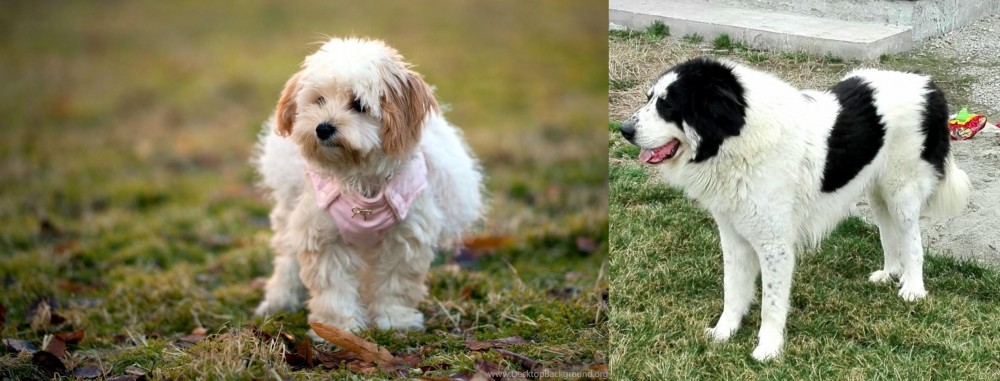 West Highland White Terrier is originated from United Kingdom but Ciobanesc de Bucovina is originated from Romania. West Highland White Terrier may grow 48 cm / 18 inches shorter than Ciobanesc de Bucovina. West Highland White Terrier may weigh 80 kg / 176 pounds lesser than Ciobanesc de Bucovina. West Highland White Terrier may live 4 years more than Ciobanesc de Bucovina. Both West Highland White Terrier and Ciobanesc de Bucovina has almost same litter size. Both West Highland White Terrier and Ciobanesc de Bucovina requires High Maintenance.
West Highland White Terrier is originated from United Kingdom but Ciobanesc de Bucovina is originated from Romania. West Highland White Terrier may grow 48 cm / 18 inches shorter than Ciobanesc de Bucovina. West Highland White Terrier may weigh 80 kg / 176 pounds lesser than Ciobanesc de Bucovina. West Highland White Terrier may live 4 years more than Ciobanesc de Bucovina. Both West Highland White Terrier and Ciobanesc de Bucovina has almost same litter size. Both West Highland White Terrier and Ciobanesc de Bucovina requires High Maintenance.
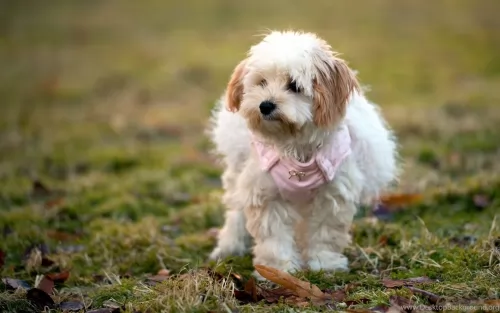 The West highland white terrier originated from Poltalloch in Scotland. So they were initially called as Poltalloch terrier and after that they were called as Roseneath terrier. They were initially used for hunting fox, badger, otter and in killing the vermin like rats.
The West highland white terrier originated from Poltalloch in Scotland. So they were initially called as Poltalloch terrier and after that they were called as Roseneath terrier. They were initially used for hunting fox, badger, otter and in killing the vermin like rats.
The breed history says that Colonel Malcolm of Poltalloch was the reason for the Westie's white colour. This is because in 19th centuryhe went for hunting with his dogs and accidentally he shot his dog as its colour was as fox. So he decided to breed only white colour dogs.
 The Ciobanesc de Bucovina is a breed that developed naturally in the Carpathian Mountains (Romania and Serbia) and some regions of Bulgaria. The breed was especially useful in the Romanian northeast regions, the county Bucovina and in the northeastern region of Serbia. These dogs are bred for guarding and herding of flocks as well as guard dogs for the family home.
The Ciobanesc de Bucovina is a breed that developed naturally in the Carpathian Mountains (Romania and Serbia) and some regions of Bulgaria. The breed was especially useful in the Romanian northeast regions, the county Bucovina and in the northeastern region of Serbia. These dogs are bred for guarding and herding of flocks as well as guard dogs for the family home.
When the area was split between Russian and Romania, the dog continued to thrive in the mountains because of the need that the shepherds had for this type of dog with the build, working ability and temperament of the Bucovina.
Finally, in the 20th century, Romania began to urbanize and industrialize. People moved to the cities from the hills and many brought their dogs with them. This allowed many non-mountain Romanians to come into contact with the Bucovina Shepherd for the first time. He became a great family dog and offered guard dog protection as well.
The Romanian Kennel Club accepted the Ciobanesc du Bucovina in 1982 and wrote the first standard then. It has since been updated in 2001 and 2002 with today’s standard. They are not accepted by the international clubs nor the big clubs in the US and Europe. This is one factor in keeping the breed rare because it is little known outside of Romania.
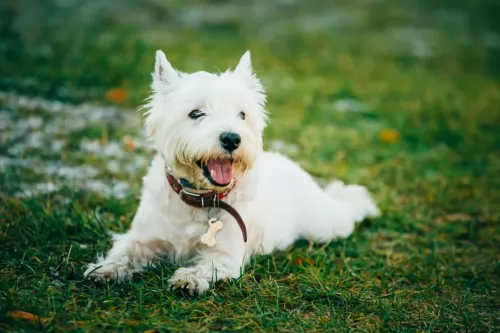 The Westie can be said as that a small dog having the talents of the big dog. They are very popular for their obedience. They are also working as therapy dogs and also some in search and rescue teams. The home having Westie will have fun always and be enthusiastic. They will suit them for country or city living, but they like to live with their family. They are well suitable for apartment living, but some training should be given to them for not barking. They can stay in home when you are at work. Westie can be taken to travel, whether it may be long vacation or a short visit.
The Westie can be said as that a small dog having the talents of the big dog. They are very popular for their obedience. They are also working as therapy dogs and also some in search and rescue teams. The home having Westie will have fun always and be enthusiastic. They will suit them for country or city living, but they like to live with their family. They are well suitable for apartment living, but some training should be given to them for not barking. They can stay in home when you are at work. Westie can be taken to travel, whether it may be long vacation or a short visit.
They are quick learners and so training them is not difficult. Mistakes of them can be corrected patiently since they don't like harsh activities against them. Westie will definitely bark when he sees something or hear different sounds. He will bark on seeing visitors or even other dogs. Sometimes they will bark for very silly things but when given appropriate training in their young stage, they can bark only for alerts.
 Most large mountain dogs resemble the Bucovina Shepherd, but this breed is more slightly built and has a lighter coat than most of the mountain dogs. They are still a very large dog weighing in between 70 and 120 pounds. They are powerfully built even if more slender than other mountain dogs. They have a long thick coat that makes it difficult to see how their bodies are formed, but they are a very muscular dog.
Most large mountain dogs resemble the Bucovina Shepherd, but this breed is more slightly built and has a lighter coat than most of the mountain dogs. They are still a very large dog weighing in between 70 and 120 pounds. They are powerfully built even if more slender than other mountain dogs. They have a long thick coat that makes it difficult to see how their bodies are formed, but they are a very muscular dog.
Their large head does indicate how powerful a dog he is, and he has a wide muzzle that tapers off at the end. The breed has small eyes that are either hazel or brown and his v-shaped ears hang downward on the side of his head. He has a wide, black nose and thick, dark lips. His tail is bushy and long.
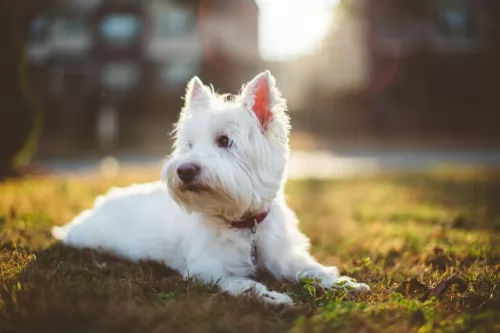 The Westie is friendly with children but not all the time. So some care should be taken while they are near children.
The Westie is friendly with children but not all the time. So some care should be taken while they are near children.
They like to chase rodents like rabbits as they are interested in hunting.
They are suitable for apartment living unless they are left alone for a very long time. They love cold weather more than hot.
They can be trained by giving some extra efforts.
 Bred to herd and guard cattle against the wolves and bears, it is a very dominant, self-assured, breed. They are intelligent yet laid back when no threat is suspected. They love children but can be hard to train. A dominant adult is needed to train and control the Ciobanesc de Bucovina. They are quite protective of their families and will patrol the property if left outside at night.
Bred to herd and guard cattle against the wolves and bears, it is a very dominant, self-assured, breed. They are intelligent yet laid back when no threat is suspected. They love children but can be hard to train. A dominant adult is needed to train and control the Ciobanesc de Bucovina. They are quite protective of their families and will patrol the property if left outside at night.
The breed has a strong mistrust of strangers but loves his adopted family. Unless threatened the Ciobanesc de Bucovina is calm and chilled. He is loyal, affectionate and dedicated. They attempt to frighten strangers with barks and growls but will attack if necessary. They are also very driven to chase prey so make sure they are in a locked fence. They can be difficult to train and seem to need a strong, alpha adult presence.
 Not much has been done to study the health of this breed so not much is known for certain. It is known that they have good health as they have survived the harsh winters in the mountains while tending to the flocks.
Not much has been done to study the health of this breed so not much is known for certain. It is known that they have good health as they have survived the harsh winters in the mountains while tending to the flocks.
Given their size and the history of mountain dogs, they could be susceptible to visual and skeletal amount of food and at the right times can prevent this. They could be susceptible to arthritis, knee and elbow dysplasia, and cataracts.
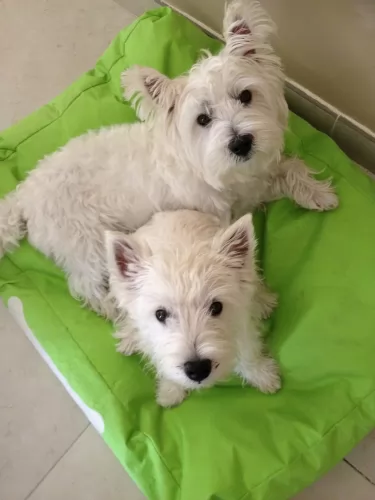 The puppy should be fed 3 to 4 times per day as it requires a considerable amount for their growth. Cooked chicken breast and turkey are best for them and also vegetables should be given to them. Beef and chicken should be kept a limit as it will lead to itchy skin and allergies.
The puppy should be fed 3 to 4 times per day as it requires a considerable amount for their growth. Cooked chicken breast and turkey are best for them and also vegetables should be given to them. Beef and chicken should be kept a limit as it will lead to itchy skin and allergies.
The preferable food for the Westie is home cooked. The home food will only contain all the essential nutrients for the Westie.
Eventhough the Westie is suitable for apartment living it is recommended to have a daily walk for him to be active and refreshing.
They should be made to play for atleast 30 minutes per day for their health as to not gain overweight. Grown up children can play with them as they like it.
 It is important not to over feed or to feed to much at one time. Even though they are large and powerful dogs, massive meals can cause bloat, so you are better off with 2-4 smaller meals per day. Also, don’t feed right before or right after strenuous exercise.
It is important not to over feed or to feed to much at one time. Even though they are large and powerful dogs, massive meals can cause bloat, so you are better off with 2-4 smaller meals per day. Also, don’t feed right before or right after strenuous exercise.
As previously mentioned this breed does not appear to have many health issues. As they developed naturally in the mountains they have not been exposed to many things there.
This was already mentioned but it is a very serious condition and requires veterinary assistance immediately under threat of death.
They can have either hip or elbow dysplasia. Can lead to arthritis of lameness.
This is a calm, even tempered dog not needing a lot of exercise. However, he is a big dog and can get obese without daily exercise. A large fenced in yard would be appreciated and a nice brisk walk every day. They would probably enjoy flyball and leurcatch. Any herding or hunting would be enjoyed.